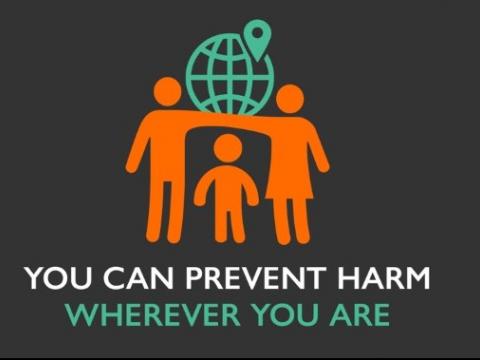Safeguarding - we can do more

As World Vision marks our annual Safeguarding Awareness Week, Norbert reflects on the role everyone has to play in safeguarding.
By Norbert Hsu
Safeguarding is one of those words that risks falling into the jargon category. For a long while, it was a word used by a fairly specific group of people in a few parts of the world. Now, it’s universal. But while the word itself is relatively new in terms the work it covers, the issue itself is not new. Whether we’ve called it “child protection”, “preventing sexual exploitation and abuse”, or “community safety”, making sure that vulnerable children and adults can live lives free from fear has been at the heart of our work since World Vision was born 70 years ago.
Perhaps to you, safeguarding means children having safe and secure ways to report incidents they have experienced or witnessed. Maybe safeguarding means ensuring children are portrayed with dignity in all photographs and their information is kept secure and private. It might mean tackling the beliefs and practices that allow abuse and exploitation to continue. Or safeguarding might, for you, be about the policy you sign when you work for an organisation.
To me, it is all of those things, and more; it starts with personal responsibility and accountability for individual actions, and goes right through to changing people’s perceptions of right and wrong and shifting attitudes and beliefs that allow abuse of children and adults to continue.
As a Christian, I am compelled by Jesus to love my God with all my heart, and to love my neighbour as I love myself. (Matthew 22:35-40). To treat others as I would like to be treated. Safeguarding comes from and is sustained out of a reverence for God and one another.
Children in Bangladesh, young women in South Sudan, fathers in Syria… Loving them the way I believe God wants us to, means treating them with the respect they deserve. It means that every individual matters, and we must honour each individual, regardless of where they live, what their role or job or position in society is. The right to live free from harassment and fear isn’t something conferred on people by those in privileged positions. Everyone, everywhere deserves to, and should, be protected from any form of exploitation or abuse. Our work to achieve this means taking up the causes of those who are more vulnerable to exploitation and abuse, particularly women and girls living in fragile places, in extreme poverty or coping with the aftermath of a humanitarian disaster.
In this area of our work, unlike in others, context is irrelevant. No belief or practice makes the abuse of children or adults acceptable. The Bible tells us there are absolute areas of right and wrong: every child is made in God’s image with inherent value, dignity, and potential (Genesis 1:26-27); Jesus tells us in Matthew 25:40 “Truly I tell you, whatever you did for one of the least of these brothers and sisters of mine, you did for me.” The lives of children are valuable in every country and context, and so they must be valued.
When children or adults are abused, their ability to have trusting relationships is often shattered. Ultimately, we want to be a part of restoring those relationships and that trust. This can and does mean tackling entrenched attitudes or beliefs, re-examining what is considered to be acceptable. My personal role in realising this starts with regularly asking how I am treating everyone I encounter, and how am I embodying what it means to keep them safe? What am I doing to make sure the children and adults in the communities and humanitarian crises we work in, recognise and report abuse when it happens? How can I make sure our partners, volunteers, and vendors are acting appropriately, always?
Taking my individual responsibility seriously means making it clear what I do not stand for, and will not tolerate. We have the ability, and we are expected, to take our own personal ownership of safeguarding. Indeed, it’s the only way things will change.
Think of it like wearing a facemask. You don’t wear a mask to prevent becoming infected with, for example, COVID-19. You wear it to protect others. Most of us are not perpetrators of violence against children and women, but we can play an important role in protecting others: reporting incidents; being a loud and consistent advocate for what is acceptable behaviour, and a campaigner, against what clearly isn’t acceptable.
As we focus on these issues this Safeguarding Awareness Week, we know that you and I have more work to do to ensure every vulnerable child and adult everywhere is safe. Sometimes in a large organisation like World Vision, we may feel we play a small or unclear role. When it comes to safeguarding, to protecting children, it very clear what our role is and what each of us needs to do. Anywhere we are, we can take responsibility for how we treat the people around us, and ensure we keep our eyes and ears open.
Norbert Hsu is World Vision’s Partnership Leader for Global Impact. Follow Norbert on Twitter @HsuNorbert